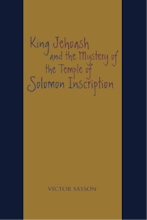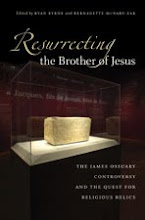SAN FRANCISCO CHRONICLE
Wednesday, October 29, 2008
Matthew Kalman, Chronicle Foreign Service
Jerusalem -- The high-profile trial of two Israeli antiquities experts accused of faking a burial box containing the remains of Jesus' brother and other priceless artifacts faced a humiliating collapse today after a Jerusalem judge advised the prosecution to consider dropping the proceedings after more than three years in court.
"After all the evidence we have heard, including the testimony of the prime defendant, is the picture still the same as the one you had when he was charged?" District Court Judge Aharon Farkash pointedly asked public prosecutor, Adi Damti. "Not every case ends in the way you think it will when it starts. Maybe we can save ourselves the rest."
The discovery of an ossuary or burial box inscribed "James son of Joseph brother of Jesus" created a sensation when first displayed at the Royal Ontario Museum in 2002. If authentic, it would be the only physical evidence ever discovered directly linked to the family of Jesus.
But the owner of the ossuary, Israeli engineer and collector Oded Golan, was arrested by Israeli police in 2003, and then charged a year later along with four others on 18 counts of forgery, fraud and damaging archaeological artifacts.
'Unholy Business'
In her new book on the case entitled "Unholy Business, A True Tale of Faith, Greed, and Forgery in the Holy Land," author Nina Burleigh appears to believe that Golan is guilty, but suspects his lawyers have raised enough doubts to avoid conviction.
The often explosive testimony has given a rare insight into the shadowy world behind the apparently cultured facade of priceless antiquities. Witnesses have described furtive encounters with Arab grave robbers, international smuggling and transactions involving hundreds of thousands of dollars based on a handshake.
But the collapse of the prosecution's case would be a major embarrassment for the Israeli police and Israel Antiquities Authority. They maintain the defendants faked the burial box along with other biblical-era relics that were then sold for huge sums of money and sent to major collections and museums around the world.
"This was fraud of a sophistication and expertise which was previously unknown," said Police Comdt. Shaul Naim, who headed a two-year police investigation. "They took authentic items and added inscriptions to make them worth millions."
Experts recant
Scholars appointed to a special committee convened by the Israel Antiquities Authority accused Golan and his co-defendants of taking valuable ancient relics and adding inscriptions to increase their value.
Shuka Dorfman, director of the Israel Antiquities Authority, had described the charges against Golan as "the tip of the iceberg. These forgeries have worldwide repercussions," he said after the indictments were filed. "They were an attempt to change the history of the Jewish and Christian people."
But under cross-examination by defense attorneys, many experts recanted some of their findings. Judge Farkash's comments, which were excluded from trial transcripts but said in open court, came after more than 80 witnesses and 10,000 pages of testimony including evidence and cross-examination of Golan and leading archaeologists and scientists from around the world.
No definitive proof
"Have you really proved beyond a reasonable doubt that these artifacts are fakes as charged in the indictment? The experts disagreed among themselves. Where is the definitive proof needed to show that the accused faked the ossuary?" Judge Farkash asked prosecutor Damti. "You need to ask yourselves those questions very seriously, and if necessary consult with your superiors in the public prosecutor's office."
The two most important items said to be fakes were the James ossuary - a limestone burial box in use during the time of Jesus and a black stone tablet inscribed with 14 lines commemorating renovations to the Temple in Jerusalem by the biblical King Joash.
Golan, a 57-year-old world-renowned expert who started collecting antiquities when he was 8 years old, has consistently denied all charges during the more than three years of proceedings.
"The James ossuary and the Joash Tablet are 100 percent authentic. I have never faked an archaeological artifact in my life," he has said.
Dozens testify
To date, witnesses have included antiquities dealers, museum curators, experts and professors of archaeology, history, epigraphy and chemical isotopes from leading universities and museums in Israel and around the world.
In four days of testimony, multimillionaire collector Shlomo Moussaieff described scenes where dealers, professors and even Israeli diplomats came to his home, produced rare antiquities from their pockets and negotiated sales worth thousands of dollars.
On one occasion, Moussaieff sent his personal banker with Golan to buy some rare seal impressions from a Palestinian villager. They parked their car on a dirt road near the border with the West Bank and when the Palestinian arrived they gave him a bag containing $150,000 in cash.
Charges dropped for 2
Charges against two of the defendants were dropped during the trial. Another man pleaded guilty to a minor charge unrelated to the main accusations, leaving Golan and antiquities dealer Robert Deutsch, who were alleged to have been the leaders of the supposed forgery ring.
"I have never faked anything nor committed any crime," said Deutsch. "The authorities have ruined my reputation and I have lost my university teaching position because of the baseless charges leveled against me. When this is over, I will sue them for slander."
Meanwhile, Judge Farkash has advised the prosecution to think about continuing the case before reconvening the trial in January.
Wednesday 29 October 2008
Subscribe to:
Posts (Atom)







